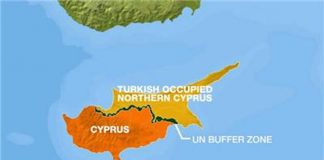Greece
The Archbishop of Cyprus criticizes strongly the plans of President Anastasiades
In a very rare gesture, the Archbishop of Cyprus Chrysostomos, in his Christmas message, read in all churches, has criticized, in unusually harsh terms, the policy of President Anastasiades and the type of “solution” of the Cyprus conflict he wants to impose on the citizens of the Republic, bypassing the need for a referendum.
The Divisions of Cyprus, by Perry Anderson
Enlargement, widely regarded as the greatest single achievement of the European Union since the end of the Cold War, and occasion for more or less unqualified self-congratulation, has left one inconspicuous thorn in the palm of Brussels. The furthest east of all the EU’s new acquisitions, even if the most prosperous and democratic, has been a tribulation to its establishment, one that neither fits the uplifting narrative of the deliverance of captive nations from Communism, nor furthers the strategic aims of Union diplomacy, indeed impedes them.
INTERNATIONAL EXPERT PANEL on Cyprus
Victoria Νuland with the backing of the European Commission are exercising now maximum pressure to the governments of Nicosia and Athens in order to agree into a new version of the Annan plan for the solution of the Cyprus conflicted, which was rejected by the overwhelming majority of Cypriot citizens back in 2004.
Ιceland, Banks and Pirates
celand recently held new elections following the resignation of its Prime Minister due to the Panama Papers. In an interview with the activist Árni Daníel Júlíussson, the Lexit Network gathered updated information on the current situation in Iceland. We spoke also about the crisis, crisis policies, social movements in Iceland, the Euro and the question of EU-Membership.
The Election of Donald Trump
The recent election of Donald Trump after Brexit, the rise of fascist votes in Europe, but also and much better, Syriza's electoral victory and the rise of Podemos are all manifestations of the depth of the crisis of the system of globalized neoliberalism. This system, which I have always considered unsustainable, implodes before our eyes in its very heart. All attempts to save the system - to avoid the worst - by minor adjustments are doomed to failure.
People wake up!
Our socio-economic system needs rebuilding from scratch. Washington has shown us again on 8 November that they offer only the choice between risking nuclear annihilation of humanity and total corporate privatization of our lives and our live services that we, the people, have created. The latter means impoverishment and enslavement to corporations for
L’élection de Donald Trump par Samir Amin
L’élection récente de Donald Trump, après le Brexist, la montée de votes fascistes en Europe, mais aussi et bien en meilleur, la victoire électorale de Syriza et la montée de Podemos, sont toutes des manifestations de la profondeur de la crise du système du néolibéralisme mondialisé.
Statement for a Standing Plan B in Europe
We, the undersigned, elected representatives, academics, trade unionists, social movements, party organisations, commit ourselves to a standing Plan B for Europe as a force of opposition and alternative to the European institutions. We refuse a Europe of permanent austerity, attacks on social and labour rights and devaluation of labour.
Αrchbishop of Canterbury: You turned Greece into the “biggest debtor’s prison...
The weight has fallen on those least able to survive, and when their own suffering was aggravated by the desperate plight of hundreds of thousands of refugees, and now millions, little help was given. What we have seen is the global market system, and especially the EU, lend people money to buy things and then strangle their hopes and futures when they cannot repay. What we now have is the biggest debtor's prison in European history.
The Greek debt, a European Tragedy
This video intends to sum up in a simple and easy way, how Greek indebtedness grew into the outbreak of the public debt crisis of 2010. It also seaks to denounce, with solid arguments, the huge disinformation around this subject. The details in this video are from the preliminary report of the Truth Committee on Public Debt.








